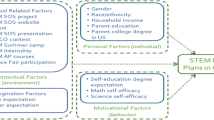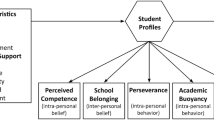Abstract
Our study draws from research on person-environment fit to investigate how conservative and liberal students sort themselves into different academic environments, and to what extent they succeed in them. We hypothesize that the apparent influence of students’ conservatism on course choice and GPA is mediated by the nature of their ambition. Our data captured pre-college ambitions and political orientation, which were used to predict course-taking and grades over four years in a cohort of students entering a large American research university. Results show that student conservatism was related to higher endorsement of mainstream ambitions (material and career success), but lower ambitions concerning social justice, political influence, art, and science. Conservatism was also related to higher enrollment in business, engineering, and music, but lower enrollment in the arts. However, GPA in different academic disciplines did not necessarily vary as a function of student conservatism. A series of mediation models demonstrated that the statistical effects of conservatism on enrollment were mediated by students’ pre-college ambitions. Though less consistently, mediation effects emerged also for the effects of student conservatism on grades in various fields. Findings support that undergraduates’ political orientation and ambitions are linked to course-taking and college GPA. Implications for person-environment fit and the role of political orientation and ambitions in higher education are discussed along with suggestions for further research.

Similar content being viewed by others
Data availability
Data analyzed in this study are available from the corresponding author upon request.
Notes
Stinebrickner and Stinebrickner (2013) demonstrated that undergraduate students are disproportionately likely to leave science majors and mathematics-intensive fields (see also Daempfle 2003). Though business and economics do involve mathematics as well, they have the reputation of being easier and especially in business there are concentrations that are not mathematics-intensive.
These data were previously used by Kemmelmeier et al. (2005).
Conservatism was related to lower levels of scientific ambition (resulting in a negative coefficient see Table 2), and higher levels of scientific ambition were related to a lower likelihood of enrolling in economics (negative coefficient; Table 6). The sign of the indirect effect, reflecting the multiplication of these negative coefficients, is thus positive (see Table 8).
References
Atkinson JW, Birch D (1970) The dynamics of action. Wiley, Hoboken
Balsamo M, Lauriola M, Saggino A (2013) Work values and college major choice. Learn Individ Differ 24:110–116
Baron R, Kenny DA (1986) The moderator–mediator variable distinction in social psychological research: conceptual, strategic, and statistical considerations. J Pers Soc Psychol 51(6):1173–1182. https://doi.org/10.1037/0022-3514.51.6.1173
Beggs JM, Bantham JH, Taylor S (2008) Distinguishing the factors influencing college students’ choice of major. Coll Stud J 42(2):381–395
Blau PM, Duncan OD (1967) The American occupational structure. Wiley, Hoboken
Bloom A (1987) The closing of the American mind: how higher education has failed democracy and impoverished the souls of today’s students. Simon and Schuster, New York
Bowman N, Felix V, Ortis L (2014) Religious/worldview identification and college student success. Relig Educ 41(2):117–133
Brand JE, Xie Y (2010) Who benefits most from college? Evidence for negative selection in heterogeneous economic returns to higher education. Am Sociol Rev 75(2):273–302
Cable DM, Edwards JR (2004) Complementary and supplementary fit: a theoretical and empirical integration. J Appl Psychol 89(5):822–834. https://doi.org/10.1037/0021-9010.89.5.822
Cable DM, Judge TA (1996) Person–organization fit, job choice decisions, and organizational entry. Organ Behav Hum Decis Process 67(3):294–311. https://doi.org/10.1006/obhd.1996.0081
Campbell C, Horowitz J (2016) Does college influence sociopolitical attitudes? Sociol Educ 89(1):40–58
Carnevale AP, Cheah B, Hanson AR (2015) The economic value of college majors. Center on Education and the Workforce, Georgetown University. https://cew-7632.kxcdn.com/wp-content/uploads/The-Economic-Value-of-College-Majors-Full-Report-web-FINAL.pdf. Accessed 12 Sept 2018
Chatman JA (1989) Improving interactional organizational research: a model of person-organization fit. Acad Manag Rev 14:333–349
Chirumbolo A, Leone L (2010) Personality and politics: the role of the HEXACO model of personality in predicting ideology and voting. Personality Individ Differ 49(1):43–48
Chopik WJ, Motyl M (2016) Ideological fit enhances interpersonal orientations. Soc Psychol Pers Sci 7(8):759–768
Clarkson JJ, Chambers JR, Hirt ER, Otto AS, Kardes FR, Leone C (2015) The self-control consequences of political ideology. Proc Natl Acad Sci USA 112(27):8250–8253
Coleman JA (1988) Social capital and the creation of human capital. Am J Sociol 94:S95–S120
Costa-Lopes R, Dovidio JF, Pereira CR, Jost JT (2013) Social psychological perspectives on the legitimation of social inequality: past, present and future. Eur J Soc Psychol 43(4):229–237
Daempfle PA (2003) An analysis of the high attrition rates among first year college science, math, and engineering majors. J Coll Stud Retent 5:37–52
Derber C (1979) The pursuit of attention: power and individualism in everyday life. Oxford University Press, Oxford
Duckworth AL, Seligman ME (2005) Self-discipline outdoes IQ in predicting academic performance of adolescents. Psychol Sci 16(12):939–944. https://doi.org/10.1111/j.1467-9280.2005.01641.x
Duckworth AL, White RE, Matteucci AJ, Shearer A, Gross JJ (2016) A stitch in time: strategic self-control in high school and college students. J Educ Psychol 108(3):329–341. https://doi.org/10.1037/edu0000062
Edwards JR (1991) Person-job fit: a conceptual integration, literature review, and methodological critique. In: Cooper CL, Robertson IT (eds) International review of industrial and organizational psychology, vol 6. Wiley, Hoboken, pp 283–357
Edwards JR, Shipp AJ (2007) The relationship between person-environment fit and outcomes: an integrative theoretical framework. In: Ostroff C, Judge TA (eds) Perspectives on organizational fit. Jossey-Bass, San Francisco, pp 209–258
Ehrensal K (2002) Training capitalism’s foot soldiers: the hidden curriculum of undergraduate business education. In: Margolis E (ed) The hidden curriculum in higher education. Routledge, New York, pp 97–113
Fernandes D, Mandel N (2014) Political conservatism and variety-seeking. J Consum Psychol 24(1):79–86
Ford ME (1992) Motivating humans: goals, emotions, and personal agency beliefs. Sage, California
Gross N, Simmons S (2014) Professors and their politics. Johns Hopkins University Press, Baltimore
Haley H, Sidanius J (2005) Person-organization congruence and the maintenance of group-based social hierarchy: a social dominance perspective. Gr Process Intergr Relat 8(2):187–203
Harackiewicz JM, Hulleman CS (2010) The importance of interest: the role of achievement goals and task values in promoting the development of interest. Soc Pers Psychol Compass 4(1):42–52
Harrison RV (1978) Person-environment fit and job stress. In: Cooper CL, Payne R (eds) Stress at work. Wiley, Hoboken, pp 175–205
Hershbei B, Harris B, Kearney M (2014) Major decisions: Graduates’ earnings growth and debt repayment. Hamilton Project, Brookings Institutions. https://www.hamiltonproject.org/papers/major_decisions_graduates_earnings_growth_debt_repayment
Holland JL (1997) Making vocational choices: A theory of vocational personalities and work environments. Psychological Assessment Resources
Hollingshead AB (1975) Four factor index of social status. Yale University, New Haven
Horowitz D (2010) Reforming our universities: the campaign for an academic bill of rights. Simon and Schuster, New York
Hout M (1988) More universalism, less structural mobility: the American occupational structure in the 1980s. Am J Sociol 93(6):1358–1400
Hout M, DiPrete TA (2006) What we have learned: RC28’s contributions to knowledge about social stratification. Res Soc Stratif Mobil 24(2006):1–20
Janoff-Bulman R, Carnes NC (2016) Social justice and social order: binding moralities across the political spectrum. PLoS ONE. https://doi.org/10.1371/journal.pone.0152479
Jost JT, Glaser J, Kruglanski A, Sulloway FJ (2003) Political conservatism as motivated social cognition. Psychol Bull 129(3):339–375. https://doi.org/10.1037/0033-2909.129.3.339
Jost JT, Banaji MR, Nosek BA (2004) A decade of system justification theory: accumulated evidence of conscious and unconscious bolstering of the status quo. Polit Psychol 25(6):881–919. https://doi.org/10.1111/j.1467-9221.2004.00402.x
Kasser T, Ryan RM (1993) A dark side of the American dream: correlates of financial success as a central life aspiration. J Pers Soc Psychol 65(2):410–422. https://doi.org/10.1037/0022-3514.65.2.410
Kemmelmeier M, Danielson C, Basten J (2005) What’s in a Grade? Academic Success and Political Orientation. Personal Social Psychol Bull 31(10):1386–1399. https://doi.org/10.1177/0146167205276085
Klein DB, Stern C (2009) By the numbers: the ideological profile of professors. In: Maranto R, Redding RE, Hess FM (eds) The politically correct university: problems, scope, and reforms. AEI Press, Washington, pp 38–59
Klein DB, Western A (2005) Voter registration of Berkeley and Stanford faculty. Acad Quest 18(1):53–65. https://doi.org/10.1007/s12129-004-1032-3
Klein DB, Stern C, Western A (2005) Political diversity in six disciplines. Acad Quest 18(1):40–52. https://doi.org/10.1007/s12129-004-1031-4
Kristof AL (1996) Person-organization fit: an integrative review of its conceptualizations, measurement, and implications. Pers Psychol 18(1):40–52. https://doi.org/10.1111/j.1744-6570.1996.tb01790.x
Langbert M (2018) Homogenous: the political affiliations of elite Liberal Arts College faculty. Acad Quest 31(2):186–197. https://doi.org/10.1007/s12129-018-9709-1
LeBar M (2015) Standardized online classes would lead toward increased efficiency in higher education. Forbes Magazine. https://www.forbes.com/sites/ccap/2015/01/22/standardized-online-classes-would-lead-toward-increased-efficency-in-higher-education/#52a49dbd415b. Accessed 18 Oct 2018
Linvill DL, Havice PA (2011) Political bias on campus: understanding the student experience. J Coll Stud Dev 52(4):487–496. https://doi.org/10.1353/csd.2011.0056
Lodahl JB, Gordon G (1972) The structure of scientific fields and the functioning of university graduate departments. Am Sociol Rev 37:57–72
Luo W (2017) Testing mediation effects in cross-classified multilevel data. Behav Res Methods 49(2):674–684. https://doi.org/10.3758/s13428-016-0723-3
Malgwi CA, Howe MA, Burnaby PA (2005) Influences on students’ choice of college major. J Educ Bus 80(5):275–282. https://doi.org/10.3200/JOEB.80.5.275-282
Mariani MD, Hewitt GJ (2008) Indoctrination U.? Faculty ideology and changes in student political orientation. PS Polit Sci Polit 41(4):773–783. https://doi.org/10.1017/S1049096508081031
Mincer J (1974) Schooling, experience, and earnings. Columbia University Press, New York
Motyl M (2016) Liberals and conservatives are (geographically) dividing. Social psychology of political polarization. Routledge, New York, pp 17–47
Muchinsky PM, Monahan CJ (1987) What is person-environment congruence? Supplementary versus complementary models of fit. J Vocat Behav 31(3):268–277. https://doi.org/10.1016/0001-8791(87)90043-1
Muthén LK, Muthén BO (2015) Mplus User’s Guide, Seventh Edition. Muthén & Muthén, Los Angeles
National Science and Technology Council, Committee on STEM Education (2018). Charting a course for success: America’s strategy for STEM education. Retrieved from: whitehouse.gov/wp-content/uploads/2018/12/STEM-Education-Strategic-Plan-2018.pdf
Ostroff C, Judge TA (eds) (2007) Perspectives on organizational fit. Taylor and Francis, New York
Pascarella ET, Terenzini PT (2005) How college affects students: a third decade of research. Jossey-Bass, Indianapolis
Peterson D (2015) All that is solid: bench-building at the frontiers of two experimental sciences. Am Sociol Rev 80(6):1201–1225
Pew Research Center (2014) Political polarization in the American public: Section 1: Growing ideological consistency. Pew Research Center. http://www.people-press.org/2014/06/12/section-1-growing-ideological-consistency/. Accessed 12 Dec 2018
Porter SR, Umbach PD (2006) College major choice: an analysis of person-environment fit. Res High Educ 47(4):429–449. https://doi.org/10.1007/s11162-005-9002-3
R Core Team (2018) R: A language and environment for statistical computing. R Foundation for Statistical Computing, Vienna, Austria. URL https://www.R-project.org/
Roth G (2019) The educated underclass: students and the promise of social mobility. Pluto Press, London
Sidanius J, Pratto F (1999) Social dominance. Cambridge University Press, Cambridge
Sidanius J, Pratto F, Martin M, Stallworth LM (1991) Consensual racism and career track: some implications of social dominance theory. Polit Psychol 12(4):691–721. https://doi.org/10.2307/3791552
Smith LD, Best LA, Stubbs DA, Archibald AB, Roberson-Nay R (2002) Constructing knowledge: the role of graphs and tables in hard and soft psychology. Am Psychol 57:749–761
Stinebrickner R, Stinebrickner TR (2013) A major in science? Initial beliefs and final outcomes for college major and dropout. Rev Econ Stud 81(1):426–472. https://doi.org/10.1093/restud/rdt025
van Laar C, Sidanius J, Rabinowitz JL, Sinclair S (1999) The three Rs of academic achievement: reading, ’riting, and racism. Pers Soc Psychol Bull 25(1):136–148. https://doi.org/10.1177/0146167299025001011
Vincent SK, Henry AL, Anderson JC (2012) College major choice for students of color: toward a model of recruitment for the agricultural education profession. J Agric Educ 53(4):187–200
Wilson S (2006) The standardization of college teaching. Inside Higher Ed. https://www.insidehighered.com/views/2006/09/12/standardization-college-teaching. Accessed 17 June 2018
Wiswall M, Zafar B (2015) Determinants of college major choice: identification using an information experiment. Rev Econ Stud 82(2):791–824
Woessner M, Kelly-Woessner A (2009) Left pipeline: why conservatives don’t get doctorates. In: Maranto R, Redding RE, Hess FM (eds) The politically correct university: problems, scope, and reforms. AEI Press, Washington, pp 38–59
Yancey G (2011) Compromising scholarship: religious and political bias in American higher education. Baylor University Press, Waco
Author information
Authors and Affiliations
Corresponding author
Ethics declarations
Conflict of interest
On behalf of both authors, the corresponding author states that there is no conflict of interest.
Supplementary Information
Below is the link to the electronic supplementary material.
Rights and permissions
About this article
Cite this article
Nesbitt, I.S., Kemmelmeier, M. Getting A’s in B-School?: Differential effects of ambitions on the course taking and academic performance of conservative and liberal college students. SN Soc Sci 1, 192 (2021). https://doi.org/10.1007/s43545-021-00196-5
Received:
Accepted:
Published:
DOI: https://doi.org/10.1007/s43545-021-00196-5




